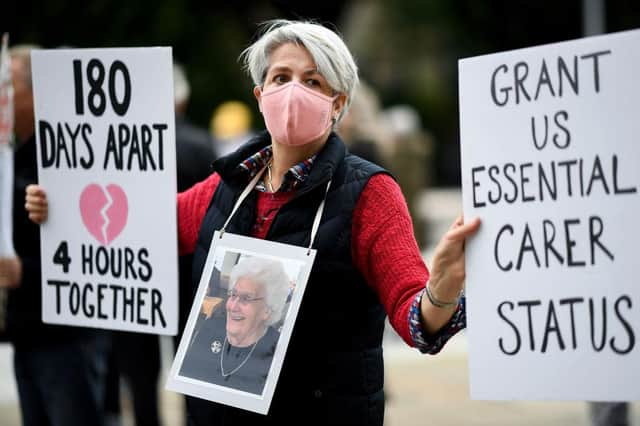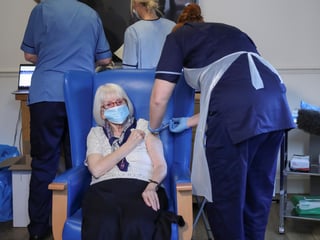Change to Covid-19 vaccine schedule a 'complete nightmare' for Scottish care home residents, say relatives


The change in guidance, which means the second dose will now be administered up to 12 weeks after the first, rather than the three to four weeks later initially planned, has been recommended by the Joint Committee on Vaccination and Immunisation (JCVI).
The Pfizer vaccine was shown to offer 52 per cent protection after the first dose in trials.
Advertisement
Hide AdAdvertisement
Hide AdBut campaign groups and relatives of those in care homes have lambasted the move, claiming it will cause distress to vulnerable older people.
Some have also criticised a perceived lack of communication from the Scottish Government.
It comes as 2,539 new cases of Covid-19 were recorded in Scotland on Friday.
First Minister Nicola Sturgeon said the new Covid-19 variant was accelerating spread. A further 14 positives were recorded in Shetland, bringing its current outbreak to 72 cases.
Advertisement
Hide AdAdvertisement
Hide AdResults from an Imperial College London study showed the new variant was “substantially” more infectious than the original, and that it affects a greater proportion of people under 20.
Chief Medical Officer Dr Gregor Smith said the protection offered by a single dose of the Pfizer vaccine was “substantial” and claimed the new dose regime would prevent more deaths than the old one.
But one care home campaign group said the change had made members “despair”.
“The fact that they started to roll it out in care homes gave us all a glimmer of hope and to now hear the second dose will be given in 12 weeks’ time, we’re absolutely despairing,” said Sheila Hall, a founding member of Care Home Residents Scotland, a campaign group representing those with family members in care homes.
Advertisement
Hide AdAdvertisement
Hide Ad“We were hoping the two doses would help to open the doors more to family members, but if they turn around and say we’ll actually have to wait another two months … every week approximately 300 people will die in a Scottish care home. That’s thousands of people who will die without having seen their relatives.
“It’s a complete nightmare.”
The Scottish Government was unable to clarify how the change in doses would affect how soon people may be able to see relatives in care homes.
Ms Hall’s mother, who is 96, was given her first dose of the vaccine a fortnight ago.
“She has her date for the second one literally in her diary,” Ms Hall said.
Advertisement
Hide AdAdvertisement
Hide Ad“If they cancel that … psychologically, it’s going to just finish her.”
Lizzie Bulloch, whose 84-year-old mother is in a care home, said she has found the sudden change in guidance confusing, and that she has not been given clear information about it.
She is also distressed by the guidance change as she hoped her mother being given two doses before the end of January would increase the chances of her being able to visit before she dies, as her mother is in end-of-life care with vascular dementia.
Ms Bulloch said she had not been able to see her mother despite visiting exceptions applying to end-of-life situations.
Advertisement
Hide AdAdvertisement
Hide Ad“It’s a bit confusing,” she said. “We don’t know where we stand now because my mum might not last 12 weeks, we don’t know, and I can’t even get to see her.”
Referring to the recent changes in dosage guidance and the effect this may have on the protection offered by the vaccine, Ms Bulloch said: “This is just awful, really it’s horrible. What do you believe, what is the truth?
“It’s just mixed signals really, mixed information.”
Ms Hall said: “I’m just praying they say they will finish what they started for care home residents and staff. It’s what we consented to for our loved ones. On the consent form, the agreement was that it would be two doses."
She added: “I can see it from the scientific point of view, but I think [the change in timeline] is OK for the general population, not when you already keep saying that care homes are a priority group.
Advertisement
Hide AdAdvertisement
Hide Ad“I’m sure they [the Scottish Government] could argue their corner as well, but they’re looking at the science behind it, and not looking at the psychology and what it’s doing to people in care homes, to the staff, and to the relatives.”
Dr Donald Macaskill, chief executive of Scottish Care, an industry body representing the independent care centre, said there was a need for clear communication to worried residents in care homes and their relatives.
“I think people's emotions are very sharp and raw, because this is the most vulnerable population imaginable,” he said.
“They've had to endure a hellish time, and this significant change makes people feel as if the protection of the wider community has been put first, over their protection.
Advertisement
Hide AdAdvertisement
Hide Ad“We need the government, and clinicians, to communicate very clearly why they've made this decision, what the effects are on individuals in terms of their own risk. Is it increased or is there no significant difference?”
He added: “I think everybody understands some of the reasons, which is that this latest strain is extremely virulent dangerous, and we need to maximise protection. The question is at what cost to an already very vulnerable population.”
Dr Smith said: “Given the very high level of protection afforded by the first dose, vaccinating a greater number of people with a single dose will prevent more deaths and hospitalisations than vaccinating a smaller number of people with two doses.
“The Joint Committee on Vaccination and Immunisation has recommended this approach, reflecting the need to reach as many people in the shortest possible timeframe within the available vaccine supplies. The protection after the first in a two-dose schedule is very substantial for both available vaccines.”
A message from the Editor:Thank you for reading this article. We're more reliant on your support than ever as the shift in consumer habits brought about by coronavirus impacts our advertisers.
If you haven't already, please consider supporting our trusted, fact-checked journalism by taking out a digital subscription.
Comment Guidelines
National World encourages reader discussion on our stories. User feedback, insights and back-and-forth exchanges add a rich layer of context to reporting. Please review our Community Guidelines before commenting.
